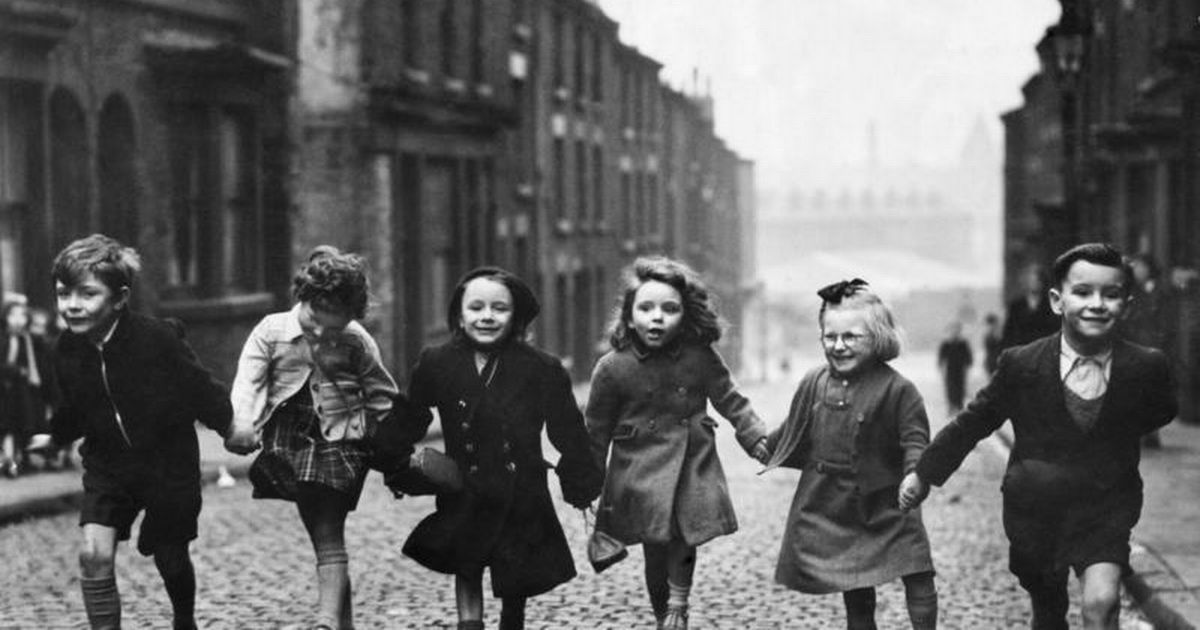Many saw their childhood changed forever by the war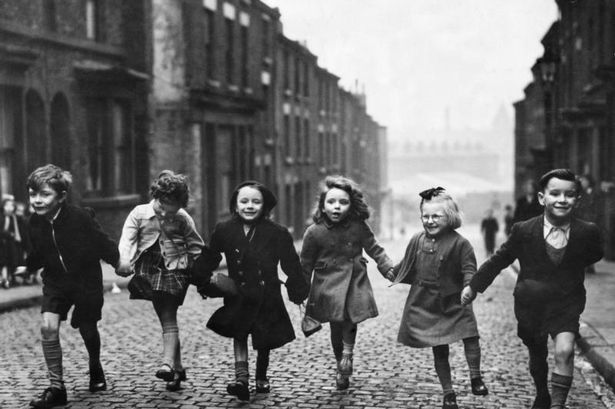 Children of Bengel Street holding hands as they walk up the terraced street from school during WWII. Circa 1939(Image: Mirrorpix)
Children of Bengel Street holding hands as they walk up the terraced street from school during WWII. Circa 1939(Image: Mirrorpix)
Today marks 80 years since VE Day – which stands for ‘Victory in Europe’ Day – the day when the German armed forces signed an unconditional surrender, and began the process of bringing WWII to an end after nearly six years.
On May 8, 1945, millions rejoiced at the news and since then, VE Day has been marked annually on the May 8 across Europe. Many across Liverpool remember what life was like in the city between 1939 and 1945 and the impact war had.
But now, the memories of a number whose childhood took place during these years are now being told in a new book. Here, we take a look back at just a few of their stories, from life as an evacuee to the devastation they saw in the city and their memories of VE Day 80 years ago.
READ MORE: ‘Lucky man,’ 100, who got ‘more than most’ when he turned 21READ MORE: VE Day celebrations as they happened in Liverpool 80 years ago
Frances Izzard, nee Twigg, was born in 1933 in the Scotland Road area and was one of 18 children. The second youngest child, Frances and three of her siblings were evacuated to Haslington in Cheshire during WWII and were split into pairs, being sent to the families of two brothers, The Brown’s.
Frances, now 91, said: “I was six on the August 23, 1939 and I was evacuated in the first week of September. It was all farms around Haslington, totally different to what I’d been used to.
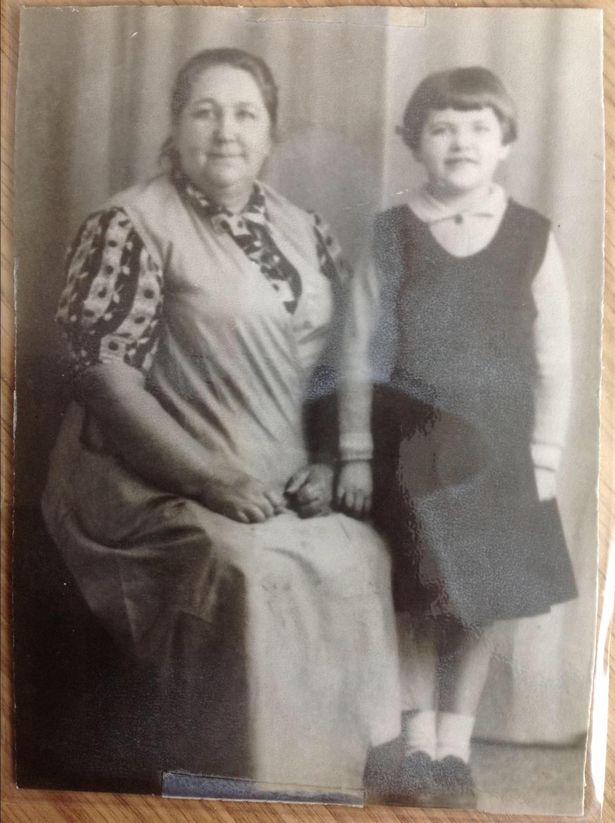 Frances Izzard, from Scotland Road, as a child with her mum(Image: Photo courtesy of Frances Izzard)
Frances Izzard, from Scotland Road, as a child with her mum(Image: Photo courtesy of Frances Izzard)
“We used to see planes coming over heading for Liverpool and where bombs had gone off like a cloud. We always felt safe in the countryside, but we’d hear all sorts of stories about what was going on in Liverpool.”
While away, Frances sadly lost five members of her family in the infamous Blackstock Gardens bombing. On December 20, 1940, her eldest brother John’s wife and five of their children were in the shelter in the courtyard of the flats when it suffered a direct hit.
Their eldest daughter, Mary, was the only to survive while another of their children, a baby, was in hospital at the time so escaped their fate. Frances lived in Haslington, Cheshire for three years but said she and her sister, Nancy, were treated poorly by their hosts.
READ MORE: ‘Secret Lowry’ who left house full of unseen artREAD MORE: Grandad’s work will ‘still be in Liverpool in a thousand years’
Frances said their ration coupons were used to their host family well, while the Twigg girls got the bare minimum. Eventually, the girls lied and said their mother had said they could go home for Christmas and went on a train to Liverpool. When their mother heard what had been going on, she vowed that they would never return, “bombs or no bombs.”
She said: “When we came back to Liverpool from being away, it looked completely different because of the bombing. You could see the centre of town was flat – absolutely flat.
“We used to play in the debris at the back of our flats, where a whole block of houses had been bombed. We used to play in the bricks, build houses with them.
“As a child, it’s all an adventure. We didn’t worry about the things your mother would worry about.”
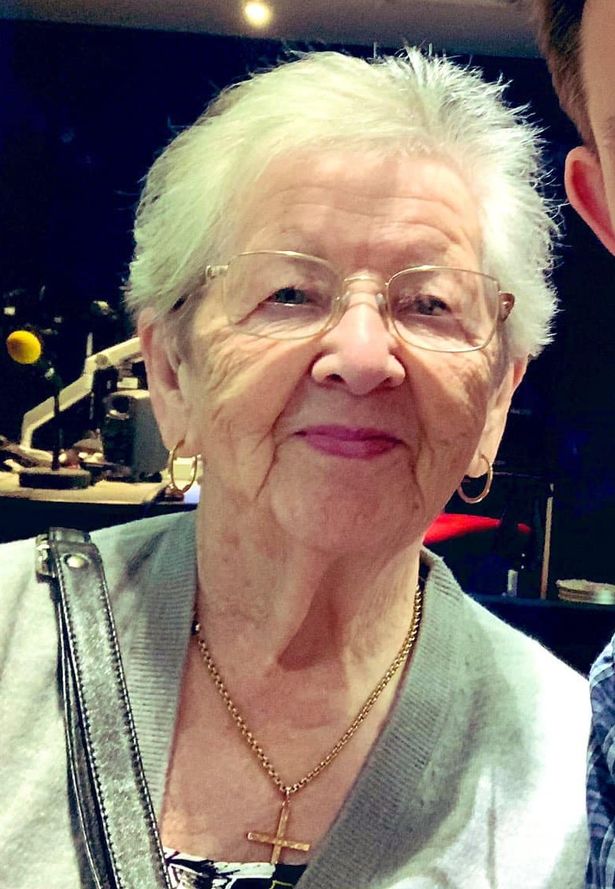 Frances Izzard, from Scotland Road, has shared her wartime memories of Liverpool (Image: Photo courtesy of Frances Izzard)
Frances Izzard, from Scotland Road, has shared her wartime memories of Liverpool (Image: Photo courtesy of Frances Izzard)
Frances said her older brother John returned from war “a shell of his old self,” but years later rebuilt his life, eventually remarrying and having two sets of twins. Frances said she remembers VE Day as being “mad” – with endless parties that went on every night for days and bonfires on the street.
Frances said: “I don’t think people went to bed. It was lovely to think there wouldn’t be any more bombs.
“There were lots of street parties for the kids, practically every street had them. We had sandwiches, cake, jelly and trifle – all the mothers served the tea.
“Then things got tidied up and we played in the street and had all sorts of games. Then as soon as it was dark the bonfire would be lit and they’d all dance around it and people would throw stuff in.”
READ MORE: I had the FA cup on my bed after what my dad didREAD MORE: Lost Liverpool nightclubs with the ‘stickiest floors’ people still remember
One of six children, Clare McGann, nee Green, grew up in Toxteth and was evacuated with her brother during the Blitz. Clare, who is mother to actors Stephen, Paul, Joe, and Mark and daughter Clare, remembers the night her family’s flat was hit on May 3, 1941 and her mum, who was heavily pregnant, was buried under the rubble.
Clare said: “It was night time and I was in bed. I must have been woken up by the noise of the bomb.
“I woke up and I said ‘there’s glass on my bed’, because there had been a window at the back of us and it had blown in. My brother Billy, being a pragmatic ten-year-old, said ‘we’ve been bombed, we’d better get up.’
“The floor was littered with debris and glass and dust and mortar. You could see rubble everywhere and we could see a flashlight coming in through a window.
“Firemen outside saw us and they were saying ‘come here.’ I remember going across the living room floor, climbing over furniture, out the window.
“We didn’t know where anybody else was. Mum was in the main bedroom and she was trapped under falling masonry, but I didn’t know that at the time.
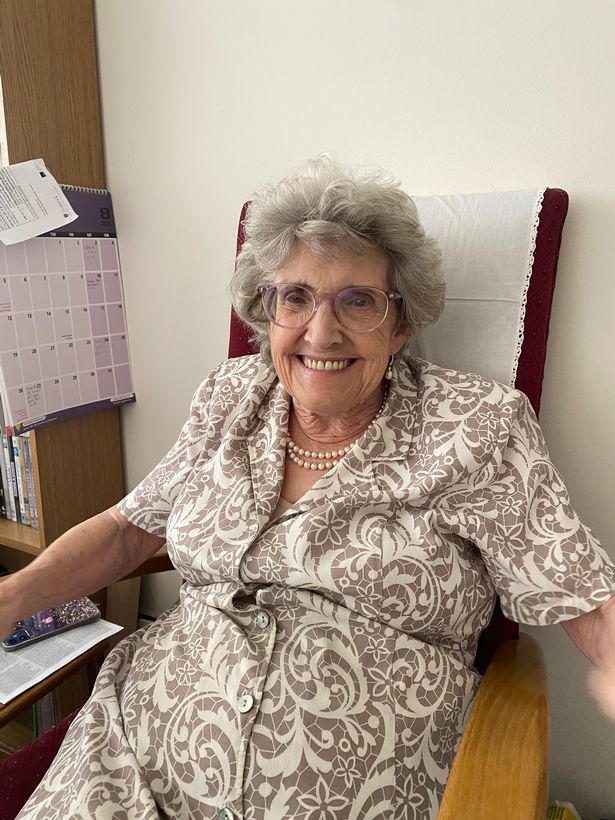 Clare McGann, from Toxteth (Image: Photo courtesy of Clare McGann)
Clare McGann, from Toxteth (Image: Photo courtesy of Clare McGann)
“The firemen took us to a police station in Essex Street, which was just opposite, and sat us there and got us some cocoa. Meanwhile, my dad was running about everywhere, trying to round us all up.
He finally found us in the police station and said thank God you’re here. He must have worked all through the night with the other helpers to get mum out. She had to be dug out of the debris and was seriously hurt.”
The Blitz saw the family made homeless and split up for almost five months, staying with two different sets of relatives in north Liverpool. Clare had to sleep in a walk-in wardrobe as there weren’t enough bedrooms and she missed out on months of schooling.
Every time they were offered a new house by the council and given the keys, her father would go there only to find it had already been bombed out. Finally they were given a tenement flat in Myrtle Gardens, which had already been bombed out earlier in the war but rebuilt.
On VE Day, Clare remembers there being a party in Myrtle Gardens. She said: “They had a lorry and on the back of the lorry there was a piano and a microphone and anyone who could perform got up and played.
“Every home had a piano in those days, so there was always somebody who could make music. There were a lot of people there and all the tables were set up in a big ‘V’ shape across the square.
“We were just so happy that it was all over. It took a long time to pick ourselves up again.
“Rationing went on for quite a long time after the war anyway. Shortages were there, and you go into your shop with all the ration books with a stack of ration books, so times were hard. But it was just such a relief not to have to worry about air raid sirens.”
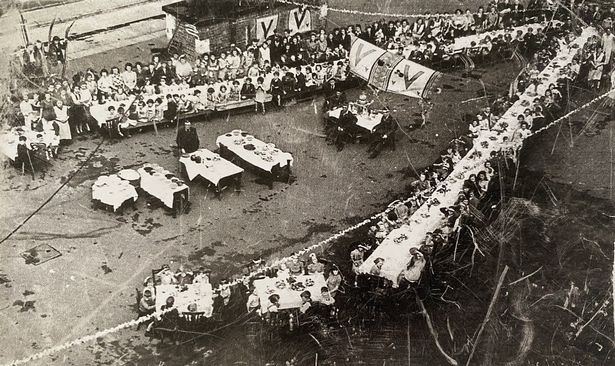 Celebrations in Myrtle Gardens for VE Day(Image: Photo courtesy of Clare McGann)
Celebrations in Myrtle Gardens for VE Day(Image: Photo courtesy of Clare McGann)
One of 15 children, Christopher Munro, now 86, grew up in cramped Victorian housing on Silvester Street, close to the docks. When war started, Chris’s dad, who was a merchant seaman, refused to let his children be evacuated to Wales like the other local kids, because he didn’t want them staying with strangers.
But being near the docks, Silvester Street was a dangerous place to live during the war. Christopher said: “There was only one public shelter and that was on the top of Sylvester Street on the right hand side.
“It wasn’t very big – you could only get 10 or 12 people in – and that was probably more for people who were walking past and had to get inside quickly. So you could bet your life that 12 or 14 people were already in there.
“But the houses there were built with the war in mind and they had cellars. We used to have to go down there as soon as the sirens went.
“Sometimes we were down there for five or six hours waiting for the all clear. If we had time, we would bring our bedding down to the cellar with us and we would play Ludo, or Snakes and Ladders, draughts.
“We could hear them bombing because we were by the docks and they used to come in very low. Fortunately, it never did land on us – but as soon as they got very close, my mum used to throw herself over us.
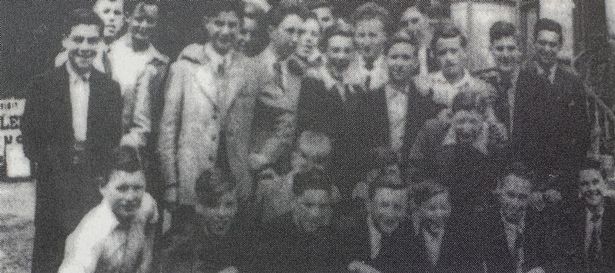 Chris – far left, in suit – and other boys at the Lee Jones League of Wellwishers Club(Image: Photo courtesy of Christopher Munro)
Chris – far left, in suit – and other boys at the Lee Jones League of Wellwishers Club(Image: Photo courtesy of Christopher Munro)
“We lost two houses at the end of our court. They got bombed.” Around the age of four or five, Christopher remember getting up at 6am and searching around for ways to make money.
He would go through bins for scrap to sell to the scrapyard or pull up floorboards from bombed out houses and sell as firewood. Christopher also remembers his dad being away at sea on a ship called the Empress of Asia, which was attacked.
Christopher said: “He was down below, stoking the coal when it was hit. There was a knock on our door and they said at first that he was missing in action.
“Mum was terrified because it was on the radio that they had no idea of its whereabouts or anything. Then the next thing is she got a telegram and it told her that he was ok.
“She was dancing around when she found out that he was alive. He was in hospital for quite a while. My dad was always unwell after that. My mum said he was never the same.
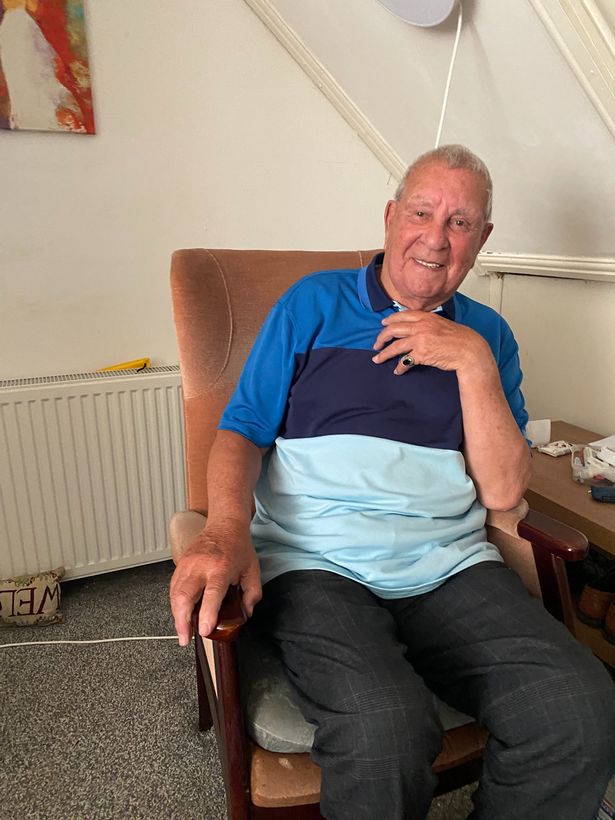 Christopher Munro is one of thousands who grew up in the city during WWII(Image: Photo courtesy of Christopher Munro)
Christopher Munro is one of thousands who grew up in the city during WWII(Image: Photo courtesy of Christopher Munro)
“It was terrible, but he still had to keep going away to see. I used to ask him why, and he would say, ‘well, who would feed you lot if I didn’t go out to sea?’ He was very brave, my dad.”
On May 8, 1945, Liverpool and elsewhere in Europe celebrated VE Day, the day when the German armed forces signed an unconditional surrender, and began the process of bringing WWII to an end after nearly six years. Like others of that generations, Christopher also remembers the huge celebrations.
He said: “We had loads of parties. It was fabulous. They had the pianos in the streets and everything.
“My mum or Uncle Tommy would play the piano and we would just party for days and days. It was just a week of celebrations.
“Very little was done for a good week. Everybody was just ecstatic that the war was finished because we went through a lot – outside of London I think it was the worst.”
Authors Duncan Barrett and Nuala Calvi previously wrote about the remarkable stories of those who worked at the famous Tate & Lyle factory in Liverpool. Their book, The Sugar Girls of Love Lane, saw Duncan and Nuala travelled to Liverpool and organised reunions to hear first-hand what life was like
Hearing so many wartime stories on their visit inspired their latest book, Blitz Kids, which tells the remarkable true stories of children who lived through the blitz not just in London but in other cities around the UK, with a big focus on Liverpool.
Ahead of VE Day, Nuala, 46, told the ECHO how important it is that these stories and memories are not forgotten. Nuala said: “I think it’s incredibly important that we recognise the role ordinary people had to play in us winning the war and that includes children.
“A lot of people imagine that in the war all the children were evacuated and they were living safely in the countryside. That’s not true.
“A lot of them either weren’t evacuated or they had a bad time being evacuated and they came home and they were there alongside their parents, their grandparents, their older siblings, witnessing these air raids night after night, spending their nights sleeping in draughty air raid shelters, hearing the German planes overhead, the crash of bombs and in many cases know, losing family members, sometimes losing their own lives
“This particular generation have lived through such extraordinary times. They’ve lived through global shifts and conflicts.
“Often, you’ll talk to someone who’s lived a very quiet and normal and ordinary life the rest of their life. But you’d never guess extraordinary things that they went through during the war and when they were so young as well.”
Blitz Kids is now available to buy. Duncan and Nuala have also created a website for people from Liverpool and beyond to continue to share their wartime memories – you can find out more here.
